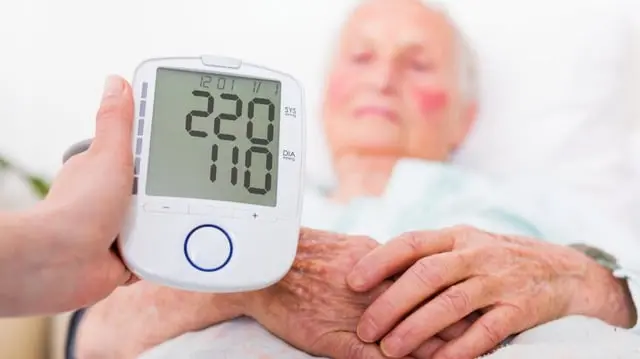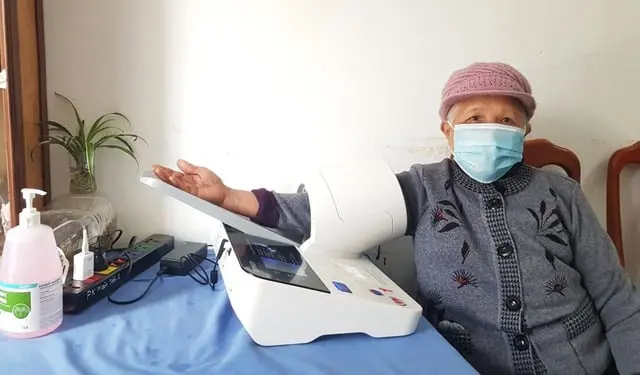Cold weather causes blood vessels to constrict, increasing blood viscosity, making the heart work harder. Elderly people with cardiovascular disease or high blood pressure are more likely to have a stroke or heart attack.
When the temperature drops, many elderly people face the risk of high blood pressure, cerebral infarction and acute cardiovascular events. Doctors warn: it is not only the cold that is worrisome, but the physiological changes inside the body - especially the phenomenon of "blood thickening" in cold weather - that are the silent cause of stroke.
Blood gets thicker in cold weather – a natural but dangerous reaction
The human body reacts to cold weather by constricting blood vessels to keep vital organs warm. However, this slows down blood circulation and makes the blood more viscous. As viscosity increases, the heart must pump harder to pump blood, causing blood pressure to rise.
In the elderly, the blood vessels are already sclerotic, the cardiovascular system is weak and the ability to regulate heat is poor, these changes become dangerous. Cold also stimulates the sympathetic nervous system to work strongly, increasing the secretion of hormones such as adrenaline and noradrenaline - which makes the heart beat faster and easily causes vasoconstriction. This is a physiological alarm mechanism, but when it happens continuously, it increases the risk of blood clot formation - a factor leading to heart attack or stroke.
Cardiologists say that just a few days of low temperatures can significantly increase the frequency of hospitalizations due to stroke, especially in the elderly, those with high blood pressure, diabetes or a history of vascular disease.

Monitoring blood pressure, drinking enough water and controlling blood lipids are ways to prevent blood thickening in cold weather.
Cold weather and the "domino chain reaction" in the body
When it’s cold, blood doesn’t just get thicker – a host of other changes occur in the circulatory system. Blood pressure rises rapidly, the heart works harder to pump blood through constricted vessels. Meanwhile, blood cholesterol levels often rise slightly in the cold due to metabolic changes, making it easier for plaque to form.
In addition, the elderly are less active in the cold season, rarely go out, and are reluctant to drink water, causing the body to lose more water and increase blood viscosity. If accompanied by stress, insomnia or using alcohol to "warm up", the risk of embolism is even greater.
A little-known point: many strokes do not occur on the coldest day, but around 2–5 days after the weather turns cold. That is when the body is already affected by prolonged vasoconstriction and changes in blood viscosity.
When "a cold snap" is enough to cause an incident
According to a neurologist, strokes in the cold season often come suddenly – many people only feel a slight numbness in their hands, a stiff neck or dizziness and then collapse. The reason is that when going out early in the morning, the large temperature difference causes blood vessels to constrict strongly, causing blood pressure to suddenly increase. If there is already atherosclerotic plaque in the blood vessels, just increasing the pressure will easily cause blood clots to form and cause blockage.
Not only when going out, even at home, the elderly can also suffer from hypothermia without realizing it. The ability to feel cold gradually decreases with age, making them subjective, while the room temperature drops sharply at night. Many cases of mild hypothermia are accompanied by high blood pressure, rapid heartbeat - the "kindling" for stroke or myocardial infarction.

The elderly need to keep warm and maintain gentle exercise to reduce the risk of stroke in cold weather.
Early warning signs not to be ignored
Elderly people or caregivers need to recognize early signs of abnormalities in the cold season:
- Weakness or numbness on one side of the body, crooked mouth, difficulty speaking, blurred vision.
- Sudden headache, dizziness, difficulty keeping balance.
- Chest pain, shortness of breath, fast or irregular heartbeat.
- Chills, purple lips, low body temperature, fatigue.
These symptoms, even if fleeting, can be warning signs of an impending stroke or heart attack. Any suspected case should be taken to a medical facility as soon as possible – because the “golden time” for emergency stroke treatment only lasts about the first 3–4 hours.
7 important recommendations to protect the heart and brain in cold weather
1. Keep warm constantly, especially at night and early morning. Room temperature should be maintained around 22–24°C, avoid large temperature differences when going out.
2. Drink enough warm water every day. Even if you are not thirsty, your body still needs water to maintain blood thinness.
3. Don't drink alcohol to "warm up". Alcohol only causes temporary vasodilation, after which the body loses heat more quickly.
4. Maintain light exercise indoors. Morning exercise in a closed room helps blood circulate better.
5. Monitor blood pressure regularly. If you have an underlying medical condition, take medication regularly and do not stop taking it on your own.
6. Eat a balanced diet, supplement with green vegetables and fatty fish. Omega-3 fatty acids help reduce platelet adhesion, reducing the risk of blood clots.
7. Get enough sleep and control stress. Prolonged stress increases the secretion of hormones that cause vasoconstriction and increase blood pressure.
Note: When winter comes, people often pay attention to their coats and thick blankets, forgetting the most important "coat" is the cardiovascular system. For the elderly, even a small change in temperature can cause the blood to thicken, the heart to work twice as hard, and a stroke can happen at any time.
So keeping warm, drinking enough water, staying active and controlling your blood pressure isn’t just common sense advice – it’s lifesaving. Don’t let cold days become a “life and death test” for your elderly family member’s heart and brain.
